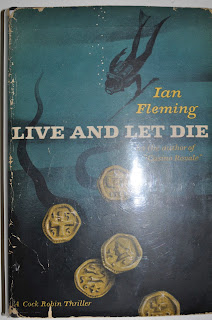In high
school, I read every Ian Fleming James Bond book. I liked them, but wasn't motivated to read them a second time until recently. I started with Live and Let Die, the second book in the
series. The novel was full of surprises. I remembered that Bond was a different
character than in the movies and the plots were less extravagant. All true. James Bond is vulnerable and feels
fear in the books. He is not as much of a loner and makes friends easily. The
plot doesn't make sense in either the book or movie, but the action/escape
scenes tend to the more realistic side in the novel. There is a fetish about
equipment, but in the book, Bond is given somewhat specialized scuba gear, while
in the movie, Roger Moore wears an electro-magnetic watch that can pull a wooden row boat by it metal rowlock. Fleming does not give Bond
futuristic gadgetry. A steel-toe shoe is about as exotic as it gets.
 |
| First Edition Cover |
Fleming was
a much better writer than I remembered. His pacing was pitch-perfect and
descriptions excellent. Although the dialogue often seemed pedestrian, Fleming
was a great storyteller. Live and Let Die
was an easy read, and there were more than a few times when I reread a section
that showed skillful writing.
The big
surprise was the racism reflected in this 1954 book. Fleming occasionally writes
favorably about his black characters, but
for the most part he relies on offensive words and stereotypes that were more
generally accepted than we would like to remember. Fleming’s attempt to reflect
black ghetto dialects seems crude and wrong. This novel demonstrates that racial
attitudes have improved in the last sixty years. Perhaps everyone, especially
the young, should read Live and Let Die
to gain a fuller understanding of the 1950s.
